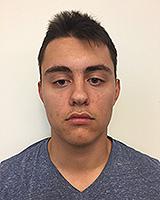Camelback French exchange student Fauconet adjusts to American lifestyle
October 2, 2017 by TJ Mathewson , Arizona State University
It’s a warm Wednesday afternoon at Camelback High School. As the time nears 4:30 p.m., the Camelback football team slowly makes its way out to the field to begin practice for the day.
The mood is loose, yet intense at the same time, with the team coming off a loss the previous week to Central.
After stretches, the team breaks off into positional drills. At around the 40-yard line next to the sideline, the linebackers get to work on their drills. Most of them are similar in size, stature and speed, but under the pads, one stands out from the others.
Meet French foreign-exchange student Robin Fauconet, who is taking every opportunity possible to immerse himself into the American culture, and for him, a big part of that is playing football.
“As a foreign-exchange student, you know you want to try the most American things possible when you come here, and (for me) it’s football,” Fauconet said.
“I’m impressed by the progress that he has made, learning the game and asking questions,” Camelback coach Shannon Carter said on Fauconet’s first year playing. “I can’t imagine (anyone else trying to play football for the first time from another country). Not at his age.”
Fauconet has parlayed that hard work into the starting middle linebacker for Camelback’s JV team. He collected his first touchdown on a scoop-and-score in the last game against Central, as well as leading the team in tackles.
“The spirit of the football team is very unique,” Fauconet said. “I play handball in France, and it is not the same as this. The teamwork is really important in this sport. Everyone needs to do their job to win.”
Carter said, “If they do play football over in France when he gets back, he is going to be a star.”
The biggest reason Fauconet decided to come from France to America was not to play football, but to better his English.
“In France, we start to learn English in sixth grade,” Fauconet said. “Each week we have two-to-three hours of it. It is an obligation. It is required. If you speak English in a country where it’s not the common language, you will succeed in your studies. It is really important.”
Transitioning from one country to another is hard enough with just the change in culture and language, but coming to the country by yourself? Almost impossible.
“The first couple of months are always the busiest (for exchange students),” said one of Fauconet’s host parents, Ken Kilday, who has hosted five foreign exchange students before Fauconet with his husband, Mark. Kilday noted that the first couple of months is when the language transition is the hardest for the exchange students.
“(The first month) is when the kids typically make the most progress,” Kilday said. “The kids also tend to be the most tired, because they are literally translating everything every day.”
Kilday and his family have done many things to get Fauconet acclimated to life in the states -- mountain biking, hiking and a trip to San Francisco among them.
“I want to improve my knowledge of English for when I go to college, because it is really important to know how to speak English,” said Fauconet, who will return to France in late June. “Also, I wanted the challenge of learning a new culture.”
